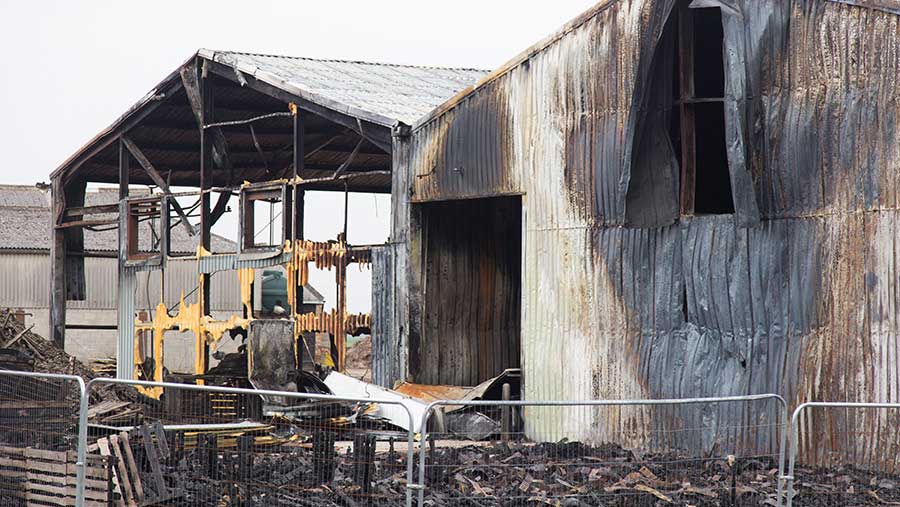Cost of farm fires totalled £95.6m in 2021, says NFU Mutual
 © Tim Scrivener
© Tim Scrivener Farmers have been urged to check electrical equipment regularly and have fire plans in place after new figures showed the cost of farm fires totalled £95.6m in 2021.
Electrical faults were the biggest known cause of blazes last year, while the cost of large-scale farm arson attacks rose from £4.7m in 2020 to £8.4m in 2021, according to rural insurer NFU Mutual. Initial claims analysis suggests more incidents in 2022, it adds.
See also: Business Clinic: How can I reduce risk of harvest farm fire?
The claims figures, which do not include fires involving agricultural vehicles and machinery, also show an increase in biomass boiler fires.
Andy Manson, head of risk management services at NFU Mutual, said farmers needed to be vigilant.
“To help protect their businesses, farmers should put fire prevention and control plans in place, such as regularly reviewing their fire risk assessment and acting on the findings,” Mr Manson said.
“Most fires are preventable by carrying out routine maintenance and inspection on heating systems, electrical installations and machinery, and controlling hot works within farm workshops.
“Implementing and maintaining good standards of housekeeping, particularly around the storage of combustibles and flammables such as hay, straw and fuels, will also reduce the risk of a fire spreading.”
NFU Mutual farm fire claims cost by area |
|||
|
Area |
2020 |
2021 |
% change |
|
Scotland |
£5.2m |
£6.8m |
31.4% |
|
North West |
£2.5m |
£3.5m |
42.8% |
|
North East |
£9.3m |
£15m |
61% |
|
Midlands |
£6.5m |
£11.7m |
80.5% |
|
Wales |
£4.3m |
£6.2m |
43.9% |
|
South West |
£14.2m |
£10.4m |
-26.5% |
|
South East |
£12.4m |
£14.1m |
14.3% |
|
East |
£23.7m |
£16.3m |
-31.2% |
|
Northern Ireland |
£15.4m |
£11.5m |
-25.4% |
|
Total |
£94m |
£95.6m |
1.7% |
|
Source: NFU Mutual. Individual area figures have been rounded, which accounts for a difference in the overall total |
|||
NFU Mutual fire safety tips
- Have a plan in place Put people at the heart of your fire plan and ensure everyone on site knows what to do in the event of a fire.
- Don’t mess with electrics Electrical faults are a major cause of fire, while electric shock can cause death or severe injury. Don’t attempt electrical work yourself and always use a qualified and competent electrician for both work and inspections. DIY modifications, poor environmental conditions (such as wet, damp or acidic atmospheres), rodents, overloaded sockets and simple wear and tear are common causes of electrical fires on farms.
- Suppress the risk Suppression systems play a critical role in detecting, containing and extinguishing fire.
- Keep on top of your housekeeping Good housekeeping is absolutely essential to ensure materials and machinery are stored correctly and to eliminate dust and debris. The build-up of waste and materials not only adds to the fuel that can burn, but can block escape routes and cause trip hazards in an emergency.
- Control hot work Welding, cutting and grinding equipment, along with blow lamps and blow torches, can produce sparks which can turn into fires if they hit combustible material. If work can’t be done outside, ensure you are in a clear, open area and far away from combustible materials (including combustible building structures). Anyone carrying out hot works on your farm should be subject to a strict “permit to work” system.
